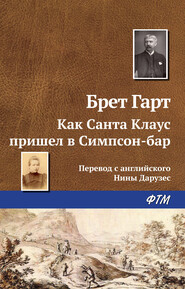По всем вопросам обращайтесь на: info@litportal.ru
(©) 2003-2024.
✖
Gabriel Conroy
Автор
Год написания книги
2017
Настройки чтения
Размер шрифта
Высота строк
Поля
Mr. Dumphy led the way, and the party followed with some celerity. Mrs. Sepulvida hung back a moment with Arthur, and whispered —
"Take me back as soon as you can!"
"You are not seriously alarmed?" asked Arthur.
"We are too near the sea here," she replied, looking toward the ocean with a slight shudder. "Don't ask questions now," she added, a little sharply. "Don't you see these Eastern people are frightened to death, and they may overhear."
But Mrs. Sepulvida had not long to wait, for in spite of the pointed asseverations of Messrs. Pilcher, Dyce, and Dumphy, that earthquakes were not only harmless, but absolutely possessed a sanitary quality, the piazzas were found deserted by the usual pleasure-seekers, and even the eloquent advocates themselves betrayed some impatience to be once more on the open road.
A brisk drive of an hour put the party again in the highest spirits, and Mr. and Mrs. Raynor again into the condition of chronic admiration and enthusiasm.
Mrs. Sepulvida and Mr. Poinsett followed in an open buggy behind. When they were fairly upon their way, Arthur asked an explanation of his fair companion's fear of the sea.
"There is an old story," said Donna Maria, "that the Point of Pines – you know where it is, Mr. Poinsett – was once covered by a great wave from the sea that followed an earthquake. But tell me, do you really think that letter of this man Conroy is true?"
"I do," said Arthur, promptly.
"And that – there – is – a – prospect – that – the – stock of this big mine may – de – pre – ciate in value?"
"Well – possibly – yes!"
"And if you knew that I had been foolish enough to put a good deal of money in it, you would still talk to me as you did the other day – down there?"
"I should say," responded Arthur, changing the reins to his left hand that his right might be free for some purpose – goodness knows what! – "I should say that I am more than ever convinced that you ought to have some person to look after you."
What followed this remarkable speech I really do not know how to reconcile with the statement that Mrs. Sepulvida made to the Donna Dolores a few chapters ago, and I therefore discreetly refrain from transcribing it here. Suffice it to say that the buggy did not come up with the char-à-banc and the rest of the party until long after they had arrived at Mr. Dumphy's stately mansion on Rincon Hill, where another costly and elaborate collation was prepared. Mr. Dumphy evidently was in spirits, and had so far overcome his usual awe and distrust of Arthur, as well as the slight jealousy he had experienced an hour or so before, as to approach that gentleman with a degree of cheerful familiarity that astonished and amused the self-sustained Arthur – who perhaps at that time had more reason for his usual conceit than before. Arthur, who knew, or thought he knew, that Miss Ringround was only coquetting with Mr. Dumphy for the laudable purpose of making the more ambitious of her sex miserable, and that she did not care for his person or position, was a good deal amused at finding the young lady the subject of Mr. Dumphy's sudden confidences.
"You see, Poinsett, as a man of business I don't go as much into society as you do, but she seems to be a straight up and down girl, eh?" he queried, as they stood together in the vestibule after the ladies had departed. It is hardly necessary to say that Arthur was positive and sincere in his praise of the young woman. Mr. Dumphy by some obscure mental process, taking much of the praise to himself, was highly elated and perhaps tempted to a greater vinous indulgence than was his habit. Howbeit the last bottle of champagne seemed to have obliterated all past suspicion of Arthur, and he shook him warmly by the hand. "I tell ye what now, Poinsett, if there are any points I can give you don't you be afraid to ask for 'em. I can see what's up between you and the widow – honour, you know – all right, my boy – she's in the Conroy lode pretty deep, but I'll help her out and you too! You've got a good thing there – Poinsett – and I want you to realise. We understand each other, eh? You'll find me a square man with my friends, Poinsett. Pitch in – pitch in! – my advice to you is to just pitch in and marry the widow. She's worth it – you can realise on her. You see you and me's – so to speak – ole pards, eh? You rek'leck ole times on Sweetwater, eh? Well – if you mus' go, goo'-bi! I s'pose she's waitin' for ye. Look you, Poinsy, d'ye see this yer posy in my buttonhole? She give it to me. Rosey did! eh? ha! ha! Won't tak' nothin' drink? Lesh open n'or bo'll. No? Goori!" until struggling between disgust, amusement, and self-depreciation, Arthur absolutely tore himself away from the great financier and his degrading confidences.
When Mr. Dumphy staggered back into his drawing-room, a servant met him with a card.
"The gen'lman says it's very important business, and he must see you to-night," he said, hastily, anticipating the oath and indignant protest of his master. "He says it's your business, sir, and not his. He's been waiting here since you came back, sir."
Mr. Dumphy took the card. It bore the inscription in pencil, "Colonel Starbottle, Siskiyou, on important business." Mr. Dumphy reflected a moment. The magical word "business" brought him to himself. "Show him in – in the office," he said savagely, and retired thither.
Anybody less practical than Peter Dumphy would have dignified the large, showy room in which he entered as the library. The rich mahogany shelves were filled with a heterogeneous collection of recent books, very fresh, very new and glaring as to binding and subject; the walls were hung with files of newspapers and stock reports. There was a velvet-lined cabinet containing minerals – all of them gold or silver bearing. There was a map of an island that Mr. Dumphy owned – there was a marine view, with a representation of a steamship also owned by Mr. Dumphy. There was a momentary relief from these facts in a very gorgeous and badly painted picture of a tropical forest and sea-beach, until inquiry revealed the circumstance that the sugar-house in the corner under a palm-tree was "run" by Mr. Dumphy, and that the whole thing could be had for a bargain.
The stranger who entered was large and somewhat inclined to a corpulency that was, however, restrained in expansion by a blue frock coat, tightly buttoned at the waist, which had the apparent effect of lifting his stomach into the higher thoracic regions of moral emotion – a confusion to which its owner lent a certain intellectual assistance. The Colonel's collar was very large, open and impressive; his black silk neckerchief loosely tied around his throat, occupying considerable space over his shirt front, and expanding through the upper part of a gilt-buttoned white waistcoat, lent itself to the general suggestion that the Colonel had burst his sepals and would flower soon. Above this unfolding the Colonel's face, purple, aquiline-nosed, throttle-looking as to the eye, and moist and sloppy-looking as to the mouth, up-tilted above his shoulders. The Colonel entered with that tiptoeing celerity of step affected by men who are conscious of increasing corpulency. He carried a cane hooked over his forearm; in one hand a large white handkerchief, and in the other a broad-brimmed hat. He thrust the former gracefully in his breast, laid the latter on the desk where Mr. Dumphy was seated, and taking an unoffered chair himself, coolly rested his elbow on his cane in an attitude of easy expectancy.
"Say you've got important business?" said Dumphy. "Hope it is, sir – hope it is! Then out with it. Can't afford to waste time any more here than at the Bank. Come! What is it?"
Not in the least affected by Mr. Dumphy's manner, whose habitual brusqueness was intensified to rudeness, Colonel Starbottle drew out his handkerchief, blew his nose, carefully returned apparently only about two inches of the cambric to his breast, leaving the rest displayed like a ruffled shirt, and began with an airy gesture of his fat white hand.
"I was here two hours ago, sir, when you were at the – er – festive board. I said to the boy, 'Don't interrupt your master. A gentleman worshipping at the shrine of Venus and Bacchus and attended by the muses and immortals, don't want to be interrupted.' Ged, sir, I knew a man in Louisiana – Hank Pinckney – shot his boy – a little yellow boy worth a thousand dollars – for interrupting him at a poker party – and no ladies present! And the boy only coming in to say that the gin house was in flames. Perhaps you'll say an extreme case. Know a dozen such. So I said, 'Don't interrupt him, but when the ladies have risen, and Beauty, sir, no longer dazzles and – er – gleams, and the table round no longer echoes the – er – light jest, then spot him! And over the deserted board, with – er – social glass between us, your master and I will have our little confab.'"
He rose, and before the astonished Dumphy could interfere, crossed over to a table where a decanter of whisky and a carafe of water stood, and filling a glass half-full of liquor, reseated himself and turned it off with an easy yet dignified inclination towards his host.
For once only Mr. Dumphy regretted the absence of dignity in his own manner. It was quite evident that his usual brusqueness was utterly ineffective here, and he quickly recognised in the Colonel the representative of a class of men well known in California, from whom any positive rudeness would have provoked a demand for satisfaction. It was not a class of men that Mr. Dumphy had been in the habit of dealing with, and he sat filled with impotent rage, but wise enough to restrain its verbal expression, and thankful that none of his late guests were present to witness his discomfiture. Only one good effect was due to his visitor. Mr. Dumphy through baffled indignation and shame had become sober.
"No, sir," continued Colonel Starbottle, setting his glass upon his knee, and audibly smacking his large lips. "No, sir, I waited in the – er – ante-chamber until I saw you part with your guests – until you bade – er – adieu to a certain fair nymph – Ged, sir, I like your taste, and I call myself a judge of fine women – 'Blank it all,' I said to myself, 'Blank it all, Star, you ain't goin' to pop out upon a man just as he's ministering to Beauty and putting a shawl upon a pair of alabaster shoulders like that!' Ha! ha! Ged, sir, I remembered myself that in '43 in Washington at a party at Tom Benton's I was in just such a position, sir. 'Are you never going to get that cloak on, Star?' she says to me – the most beautiful creature, the acknowledged belle of that whole winter – '43, sir – as a gentleman yourself you'll understand why I don't particularise – 'If I had my way, madam,' I said, 'I never would!' I did, blank me. But you're not drinking, Mr. Dumphy, eh? A thimbleful, sir, to our better acquaintance."
Not daring to trust himself to speak, Mr. Dumphy shook his head somewhat impatiently, and Colonel Starbottle rose. As he did so it seemed as if his shoulders had suddenly become broader and his chest distended until his handkerchief and white waistcoat protruded through the breast of his buttoned coat like a bursting grain of "pop corn." He advanced slowly and with deliberate dignity to the side of Dumphy.
"If I have intruded upon your privacy, Mr. Dumphy," he said, with a stately wave of his white hand, "if, as I surmise, from your disinclination, sir, to call it by no other name, to exchange the ordinary convivial courtesies common between gentlemen, sir, – you are disposed to resent any reminiscences of mine as reflecting upon the character of the young lady, sir, whom I had the pleasure to see in your company – if such be the case, sir, Ged! – I am ready to retire now, sir, and to give you to-morrow, or at any time, the satisfaction which no gentleman ever refuses another, and which Culpepper Starbottle has never been known to deny. My card, sir, you have already; my address, sir, is St. Charles Hotel, where I and my friend, Mr. Dumphy, will be ready to receive you."
"Look here," said Mr. Dumphy, in surly but sincere alarm, "I don't drink because I've been drinking. No offence, Mr. Starbottle. I was only waiting for you to open what you had on your mind in the way of business, to order up a bottle of Cliquot to enable us to better digest it. Take your seat, Colonel. Bring champagne and two glasses." He rose, and under pretence of going to the sideboard, added in a lower tone to the servant who entered, "Stay within call, and in about ten minutes bring me some important message from the Bank – you hear? A glass of wine with you, Colonel. Happy to make your acquaintance! Here we go!"
The Colonel uttered a slight cough as if to clear away his momentary severity, bowed with gracious dignity, touched the glass of his host, drew out his handkerchief, wiped his mouth, and seated himself once more.
"If my object," he began, with a wave of dignified depreciation, "were simply one of ordinary business, I should have sought you, sir, in the busy mart, and not among your Lares and Penates, nor in the blazing lights of the festive hall. I should have sought you at that temple which report and common rumour says that you, sir, as one of the favoured sons of Fortune, have erected to her worship. In my intercourse with the gifted John C. Calhoun I never sought him, sir, in the gladiatorial arena of the Senate, but rather with the social glass in the privacy of his own domicile. Ged, sir, in my profession, we recognise some quality in our relations even when professional with gentlemen that keep us from approaching them like a Yankee pedlar with goods to sell!"
"What's your profession?" asked Mr. Dumphy.
"Until elected by the citizens of Siskiyou to represent them in the legislative councils I practised at the bar. Since then I have been open occasionally to retainers in difficult and delicate cases. In the various intrigues that arise in politics, in the more complicated relations of the two sexes – in, I may say, the two great passions of mankind, Ambition and Love, my services have, I believe, been considered of value. It has been my office, sir, to help the steed of vaulting ambition – er – er – over the fence, and to dry the – er – tearful yet glowing cheek of Beauty. But for the necessity of honour and secrecy in my profession, sir, I could give you the names of some of the most elegant women, and some of the first – the very first men in the land as the clients of Culpepper Starbottle."
"Very sorry," began Mr. Dumphy, "but if you're expecting to put me among your list of clients, I" —
Without taking the least notice of Dumphy's half-returned sneer, Colonel Starbottle interrupted him coolly:
"Ged, sir! – it's out of the question, I'm retained on the other side."
The sneer instantly faded from Dumphy's face, and a look of genuine surprise took its place.
"What do you mean?" he said curtly.
Colonel Starbottle drew his chair beside Dumphy, and leaning familiarly over his desk took Mr. Dumphy's own penholder and persuasively emphasised the points of his speech upon Mr. Dumphy's arm with the blunt end. "Sir, when I say retained by the other side, it doesn't keep me from doing the honourable thing with the defendant – from recognising a gentleman and trying to settle this matter as between gentlemen."
"But what's all this about? Who is your plaintiff?" roared Dumphy, forgetting himself in his rage.
"Ged, sir – it's a woman – of course. Don't think I'm accusing you of any political ambition. Ha! ha! No, sir. You're like me! it's a woman – lovely woman – I saw it at a glance! Gentlemen like you and me don't go through to fifty years without giving some thought to these dear little creatures. Sir, I despise a man who did. It's the weakness of a great man, sir."
Mr. Dumphy pushed his chair back with the grim deliberation of a man who had at last measured the strength of his adversary and was satisfied to risk an encounter.
"Look here, Colonel Starbottle, I don't know or care who your plaintiff is. I don't know or care how she may have been deceived or wronged or disappointed or bamboozled, or what is the particular game that's up now. But you're a man of the world, you say, and as a man of the world and a man of sense, you know that no one in my position ever puts himself in any woman's power. I can't afford it! I don't pretend to be better than other men, but I ain't a fool. That's the difference between me and your clients!"
"Yes – but, my boy, that is the difference! Don't you see? In other cases the woman's a beautiful woman, a charming creature, you know. Ged, sometimes she's as proper and pious as a nun, but then the relations, you see, ain't legal! But hang it all, my boy, this is – YOUR WIFE!"
Mr. Dumphy, with colourless cheeks, tried to laugh a reckless scornful laugh. "My wife is dead!"
"A mistake – Ged, sir! – a most miserable mistake. Understand me. I don't say that she hadn't ought to be! Ged, sir, from the look that that little blue-eyed hussy gave you an hour ago – there ain't much use of another woman around, but the fact is that she is living. You thought she was dead, and left her up there in the snow. She goes so far as to say – you know how these women talk, Dumphy; Ged, sir, they'll say anything when they get down on a man – she says it ain't your fault if she wasn't dead! Eh? Sho?"
"A message, sir, business of the Bank, very important," said Dumphy's servant, opening the door.
"Get out!" said Dumphy, with an oath.
"But, sir, they told me, sir" —
"Get out! will you?" roared Dumphy.

















